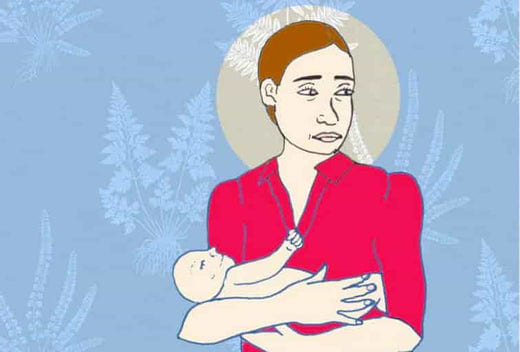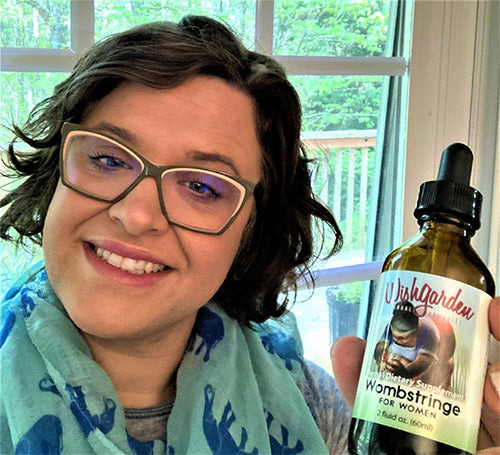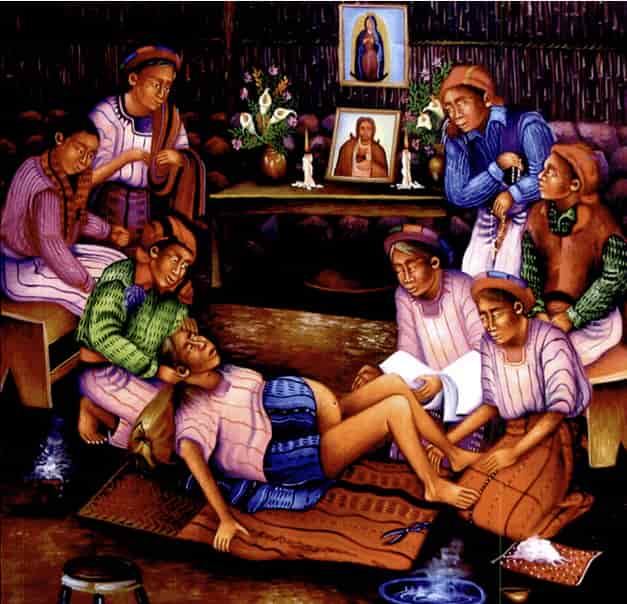Midwifery, the practice of assisting women in childbirth, has existed for thousands of years. The role of a midwife includes monitoring pregnant women during the entire nine months, assisting in labor, assessing care requirements, and creating care plans for after baby is born. Midwife nurses are an important resource for many women during this exciting and delicate time of their life! They have been known to help women in poverty-stricken communities, as well as women without adequate medical resources.
WishGarden Herbs was founded by a midwife and has deep roots in midwifery with an extensive liquid herbal extract line for every reproductive stage. Herbs can be used as tools for midwives, the general population, or used to soothe postpartum and restore balance.
The History of Spiritual Midwifery
Historically, many societies have had midwives deeply rooted within their culture. Mayan society believed midwives were responsible for all pregnant women and would continue care into the postpartum stage. Amongst the Mayans, it was believed that their destined occupations were presented in their dreams by God. Mayan midwives were believed to have a divine calling and could communicate with the supernatural world. Ancient Egyptians recognized midwifery as a woman's occupation in their medical papyrus of Herbal Knowledge called the Ebers Papyrus. This historic book dates back to 155 BC and has cemented midwifery and herbalism together for thousands of years!
Midwives didn't hold their high societal status in the Americas during the late 1800s. At this point of time, they were believed to be witches or evil doers because of their connection with utilizing plant allies in their practice. This was also a time where families started looking to doctors for childbirth aid and creating a male dominant practice. However, it's important to keep in mind that most women didn't have access to formal training and education. This combination fueled the transition from child birthing at home to more childbirths taking place in hospitals.

What does a modern nurse-midwife look like?
To enter the field of contemporary midwifery today, an approved midwifery degree is necessary. Leading to registration with the Nursing and Midwifery Council, the title requires high emotional intelligence, as well as patience in order to assist women during all facets of their childbirth. Nurse-Midwives were first required to be licensed in New York state in 1716, but formal training wasn't reported until 1765. Today, most midwives work in birthing centers and women's clinics.
WishGarden sprouted from activism
The formulator and president of WishGarden Herbs, Catherine Hunziker was very much involved in the Herbal Renaissance during the early 1970s as an activist for women's health and women's rights, and her connection with folk herbalism and midwifery planted the seeds from which WishGarden sprouted. She was training to be a nurse-midwife at the Iowa City-based Emma Goldman Clinic, empowering women's health. When interviewed, Catherine spoke of how "the feminist movement of the "60s was leading us to reclaim our bodies" and "women were reclaiming their birthing experience" into the early 1970s, which led to emerging midwifery legislation. Pockets of midwifery activism could be found in the northwest Pacific and here in Boulder, Colorado. The activism resulted in doctors sponsoring midwives and legalizing midwives to practice in hospitals.
Catherine attended many births and connected midwifery with folk herbalism as she moved towards childbirth education. She gave birth to her own children and continued with the birthing movement as an educator. Catherine purchased WishGarden Herbs from another midwife and friend in 1987. The formulas are made the old fashion way, inspired by folk herbalism still to this day!
Formulas for women
WishGarden Herb's liquid herbal extractions are popular with modern midwives as they support a woman's fertility and health through each stage of pregnancy, to delivery, and postpartum.
Fertility Prep Conception Support is formulated with herbs to support optimum fertility. It is traditionally used during the months prior to conception.
Morning Sickness Nausea Relief is formulated for pregnancy and made with gentle herbs like peach leaf to support the liver and quell the discomforts of morning sickness.
Pregnancy can have many challenges from day-to-day, so promoting serenity and relaxation is most important. Stress Release Tension Tamer for Pregnancy is perfect for dealing with common stressors, a worried mind, or emotional tensions. Passionflower, Milky Oats tops, and Lemon Balm combine beautifully to support nervous system health.
AfterEase For After Birth Contractions is another tried and true combination made with cramp bark, black haw, motherwort, and yarrow. It can be used topically or orally to soothe afterbirth contractions and discomforts. Women have reported that it is the only thing they carried around from room to room besides their baby!
Milk Rich Supply Booster is formulated for breastfeeding mothers and promotes milk supply.
For further information, please view our pregnancy line.
Herbal formulas are great tools for healthy childbearing years, but midwives are most important in supporting a woman's adventure in childbirth.
Lauren Ann Nichols-Sheffler attended The Colorado School of Clinical Herbalism and received her certificate in medical herbalism. She is the owner of Blue Yarrow Herbs aka Herbal Vice, an herbal product company practicing bioregional herbalism by cultivating plants and sourcing locally. Lauren loves educating and advocating for plant sustainability. She is the sourcing and Purchasing manager for WishGarden Herbs.
For educational purposes only. This information has not been evaluated by the Food and Drug Administration. This information is not intended to diagnose, treat, cure, or prevent any disease, or sell any product.
Recommended Products
Further Reading













